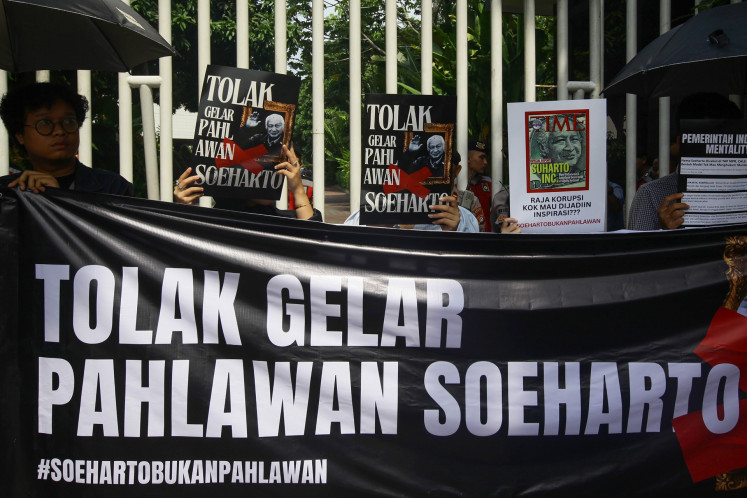Popular Reads
Top Results
Can't find what you're looking for?
View all search resultsPopular Reads
Top Results
Can't find what you're looking for?
View all search resultsThe Jakarta bombing: A lesson in inequality
Although the JW Marriott and the Ritz-Carlton hotel bombings are still under investigation by the police, speculation on who blasted the bombs and the motives behind them is growing among the public
Change text size
Gift Premium Articles
to Anyone
A
lthough the JW Marriott and the Ritz-Carlton hotel bombings are still under investigation by the police, speculation on who blasted the bombs and the motives behind them is growing among the public.
Some elements in our society have started blaming each other for the failure of the authorities to provide peace in the country’s most important city, while others are pointing fingers at who should be held responsible for the blasts. One thing is very clear, the Friday blasts included at least one message, if not many.
Furthermore, the government has so far focused only on the terrorist group related to Noordin M. Top, while in reality, there may be many others with a wide range of messages.
However, I do not wish to add to the speculations as to who is to blame for the blasts as it is the police that have to find the answers and reveal them to the public.
Radical Islamic groups are generally always blamed for bomb blasts in every single corner of the world, including Indonesia. With respect to the presumption of innocence and without adding blame to radical Islamic groups, I have written this article with the aim of putting into perspective, from an economic point of view, why radical Islamic groups exist in Indonesia and what allows them to flourish.
I strongly believe that a better understanding of these fundamental issues will help the government put in place the right development policies to strategically resolve the radicalism of Islam in Indonesia in the long term.
One may question why I draw the connecting line between development policies and radical Islam in Indonesia. What message do I want to deliver?
Is there really a line in between those two? We can go on and on debating this, but the bottom line in my opinion, is that radical Islam is a consequence rather than a cause.
Among Muslims, Islam is accepted not only as a belief, but also as complete guide to life. Islam teaches one how to lead a life of well-being. Islam teaches peace.
Islamic principles state that peace can only be restored in the presence of widespread social justice with the strong support of law enforcement.
Most importantly, through all its principles in various aspects of life, Islam rejects inequality, including unequal access to economic opportunities and economic well-being. In regard to reaching peace, Islam also teaches its followers to fight back all forms of social injustice, so-called jihad, a teaching that may be understood by Muslims in a multitude of ways.
Indonesia has recorded significant economic growth in the past few years following the Asian financial crisis of 1997-1998 and has been applauded for its successful economic policies.
However, data shows that around 18 percent of Indonesia’s population or equal to around 43 million people still lived below the poverty line in 2008 (using the standard of the Asian Poverty Line at roughly US$1.35 per day).
The World Bank report shows the unemployment rate reached 8.4 percent in 2008. Indonesia’s Gini Index, an index used to measure the degree of inequality in the distribution of family income, is 39.4 percent, or ranked 66th in the world.
The country’s GDP reached $510.8 billion in 2008 with GDP per capita at $3,900. The GDP was contributed to by agriculture, industry and service sectors, measuring 13.5 percent, 45.6 percent and 40.8 percent respectively. The most interesting thing is the fact that agriculture absorbs 42.1 percent of Indonesia’s work force whereas industry absorbs only 18.6 percent and services 39.9 percent.
This data reveals the poor quality of life that families involved in agriculture have in comparison to other sectors in Indonesia, ignoring other agricultural related problems such as limited access to land ownership, capital and market.
In summary, Indonesia is still struggling with many poverty-related problems, from poor access to healthcare, education and clean water as well as worsening urban poverty and all its complex problems.
On the other hand the government, in various partnerships with domestic and international corporations, aggressively exploits natural resources. People living around exploited areas are rarely involved in these economic activities conducted in their homeland.
In so many cases, they enjoy almost no benefit, rather they bear all the risks caused by the massive exploitation of those natural resources.
In addition, people are exposed to widening corruption and bribery practices found at every level of government across Indonesia. People also believe the judicial authorities across the board are reluctant to deal with corruption and bribery problems. Therefore, economic well-being as reflected in economic growth is really only enjoyed by a very small group of people, while the majority of the population does not enjoy these privileges.
When inequality has become so stark and the voice of frustrated sufferers finds no way to be heard, the fight for justice will always find its own way. And radicalism seems to be the most effective voice.
In conclusion, as long as social injustice still exists in Indonesia, I believe, those who are willing to sacrifice their lives by carrying bombs and other high explosive materials will always exist.
They are there to demand their voices are heard. They are there to fight for what they believe in.
Unfortunately, they are vulnerable to being used by certain people to intentionally create chaos in the country, or even by those who just want to send a short message to a particular audience.
The writer is International Business Scholar, Brandeis University, Massachusetts and founder of Aceh Initiative.










